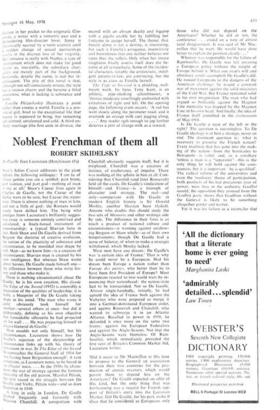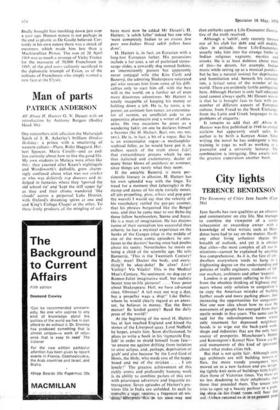Noblest Frenchman of them all
ROBERT SKIDELSKY
De Gaulle Jean Lacouture (Hutchinson 45s)
Shaw's Julius Caesar addresses to the giant sphinx the following soliloquy : 'I am he of chose genius you are a symbol; part brute, part woman, and part god—nothing of man in me at all.' Shaw's Caesar lives again in Charles de Gaulle, not the Caesar of the Gallic wars to be sure, but Caesar the states- man. There is almost nothing of man in him, and not a little of god: the Romans would surely have deified him. The being who emerges from Lacouture's brilliantly sugges- tive essay is someone entirely contrived and calculated, a finely-honed instrument of statesmanship: a typical Shavian hero in fact. Both Shaw and De Gaulle derived from Bergson the doctrine of creative evolution, the notion of the plasticity of substance and circumstance, to be moulded into shape by will. Man—as we know him—is a creature of circumstance; Shavian man is created by his own intelligence. But whereas Shaw wrote about heroes, De Gaulle made himself one— the difference between those who write his- tory and those who make it.
There is nothing circumstantial about De Gaulle; he is his own creation. His classic The Edge of the Sword (1932) is ostensibly a discussion of the qualities of leadership; it is really a blueprint of the De Gaulle taking 'live in his mind. 'The man who wrote it quite obviously took himself for ,mother—several others at once—but did it deliberately, defining as his own objective that formidable silhouette he had projected on the wall ... He was preparing himself to discuss General de Gaulle: Man moulds not only himself, but his circumstances. Lacouture shows how De Gaulle's rejection of the dictatorship of circumstance links up with his theory of movement in war. In The Edge of the Sword he reproaches the General Staff of 1914 for not having been Bergsonian enough'. A rare Complaint, as Lacouture notes, to be heard in an officers' mess. ... In the 1930s he cham- Pions the war of strategy against the fortress mentality of his old patron, Marshal Petain, the first round in the struggle between De Gaulle and Vichy. Main wins—and so does Guderian in 1940.
A king in exile in London, De Gaulle dashed frequently and famously with Winston Churchill. A comparison with
Churchill obviously suggests itself, but it is misplaced. Churchill was a creature of instinct, of exuberance, of impulse. There was nothing of the sphinx in him at all. Con- sidering that Churchill (and later Roosevelt) held all the cards, De Gaulle's vindication of himself—and France—is a triumph of character and strategy. The real—and only—comparison with De Gaulle in modern English history is Sir Oswald Mosley, another Shavian hero (failed). Anyone who doubts this should study the two sets of Memoirs and other writings side by side. The difference in their fates is as much a product of national culture and circumstances—a warning against swallow- ing Bergson or Shaw whole—as of their own temperaments; though De Gaulle had a sense of balance, of when to make a strategic withdrawal, which Mosley lacked.
Most men have one dream: De Gaulle's was 'a certain idea of France.' That is why he could never be a European. Had his dream been Europe a nation rather than Europe des patries, who better than he to have been first President of Europe? Most Europeans reacted to two world wars by re- nouncing their nationhood : the nation-state had to be transcended. Not so De Gaulle. Almost single-handedly, initially, he had upheld the idea of France both against the Vichyites who were prepared to merge it into a German-dominated European order, and against Roosevelt and Churchill, who wanted to submerge it in an Atlantic Alliance. Recalled to power in 1958, he defended it once more on the same two fronts: against the European Federalists and against the Anglo-Saxons. Not that the Anglo-Saxons were blameless. Of Ram- bouillet, which immediately preceded the first veto of Britain's Common Market bid, Lacouture writes: 'Did it occur to Mr Macmillan at this time to propose to the General an association between their two countries for the pro- duction of atomic reactors, which would permit them to depend less on the Americans? De Gaulle expected an offer of this kind, but the only thing that was forthcoming was a request for French sup- port of Britain's entry into the common Market. Did De Gaulle, for his part, make it clear that he considered as Europeans only those who did not depend on the Americans? Whether he did or not, the conference . . . ended on a note of almost total disagreement. It was said of Mr Mac- millan that he wept. He would have done better to explain the position clearly ... '
Whoever was responsible for the failure of Rambouillet, De Gaulle was left pursuing a European policy without the weight of Europe behind it. What one man's will and obstinacy could accomplish De Gaulle's did. He roused Europeans to the dangers of the American challenge; he waged a constant war of movement against the solid structures of the Cold War. But France remained solid in his own imagination. The man who had argued so brilliantly against the Maginot Line mentality was trapped by the Maginot Line in his own head. And finally, the idea of France itself crumbled in the evenentents of May 1968.
Is De Gaulle a man of the left or the right? The question is meaningless. To De Gaulle ideology is at best a strategy, never an end. The dominant question is: what is necessary to preserve the French nation? Every tradition that has gone into the mak- ing of the nation—from the barricades to Bonaparte—is valid; and, as a corollary 'unless a man is a "separatist"—this is the only thing he will hold against the com- munists, but it is important—he is qualified'. The radical reform of the universities and even the 'mediocre' theme of participation, both products of his last precarious year of power, were thus in the authentic Gaullist mould; the opposition they aroused from the Gaullist party shows that Gaullism without the General is likely to be something altogether pettier and nastier.
Yet it was his failure as a reconciler that
finally brought him tumbling down just over a year ago. Human nature is not perhaps in the end as plastic as De Gaulle believed. Cer- tainly in his own nature there was a streak of meanness which made him less than a Machiavellian Prince. The non of 28 April 1969 was as much a revenge of Vichy France for the massacre of 50,000 Frenchmen in 1945, of the pied noirs callously sacrificed in the diplomatic triumph of Evian, as of the millions of Frenchmen who simply wanted a new face at the Elysee.



































 Previous page
Previous page